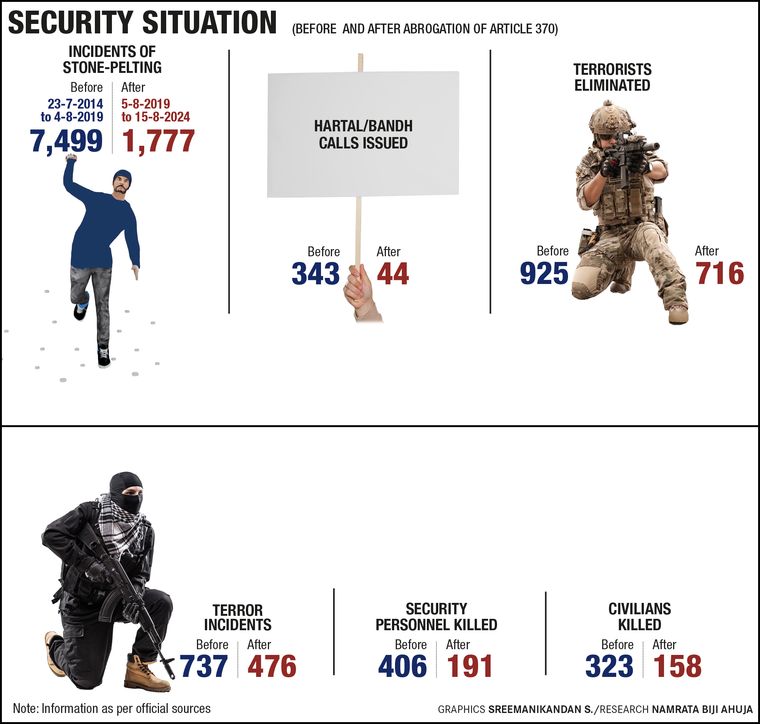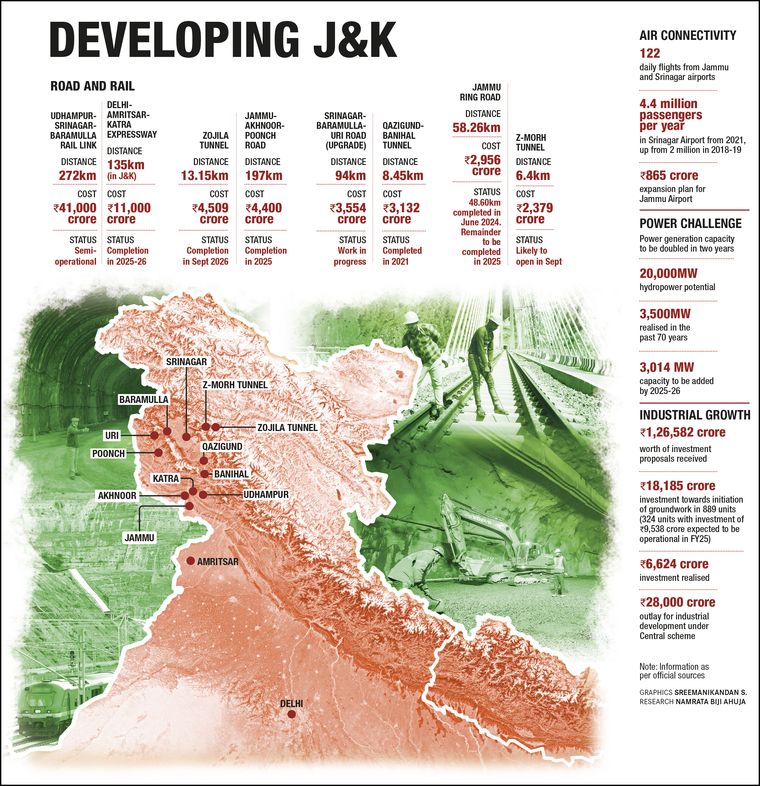Elections are necessary in democracies, because the core strength of democracy lies in participatory politics. Today, Jammu and Kashmir is preparing to hold its first assembly elections in a decade, in a strategic-sociopolitical environment that underwent a radical transformation after the abrogation of Article 370 on August 5, 2019.
The big question now: how can political parties help make the elections free and fair, ensuring that voters overcome challenges rooted in historical reasons that had pitted a sizeable section of the population against the Indian state?
The polls will define what a vote for democracy means in Jammu and Kashmir today. In the past five years, there has been a sharp swing in the rhetoric of political parties in Jammu and Kashmir―from a vocal unwillingness to fight the polls unless Article 370 was restored, to demands for statehood and, finally, expressing willingness to participate in the polls. Some politicians even concede that boycotting the district development council polls in 2020 was a mistake.
This demonstrates two points. First, the Indian state matters. Second, the political class―including the BJP, the Congress, the National Conference and the Peoples’ Democratic Party―understands that for the common man bijli, sadak, paani (electricity, road, water) matter. Hospitals, schools and colleges matter. Roads and infrastructure matter. Employment matters.
Politicians, as most Kashmiris would agree, have not historically done well when it comes to meeting their expectations. Hence, the apprehension among voters about whether the upcoming polls would bring much-needed relief in their day-to-day lives or just be a vehicle for vote bank politics that would skirt around issues of development and governance.

So, in an ecosystem that has failed to deliver on public welfare, and has, over time, become vulnerable to not just terrorism and separatism, but also anti-India sentiments, how must the Indian state respond?
It must respond with democratic fervour, as it is doing today―by preparing to hold the much awaited polls. The annual budget of Jammu and Kashmir had always been enriched by grants from the Union government, irrespective of the party in power. Now, the promise of welfare schemes must come without colour or tags.

“If both the elected government and the lieutenant governor work towards peace and progress, how can there be any difference [between them]?” said Lieutenant Governor Manoj Sinha. “The elected government will get complete support of the office of the LG if it wants to work towards peace and development of Jammu and Kashmir.”
The people are eager to elect their representatives. “I have felt the pulse of the people during my public meetings,” said Vijay Kumar Bidhuri, divisional commissioner of Kashmir. “They are very eager for the polls. They have seen that, during the panchayat and local body polls, the sarpanch and block members have been able to distribute benefits of welfare schemes. There is a feeling of empowerment that percolates down when elections are held.”
The recent Lok Sabha polls saw a sharp rise in the number of candidates, because of which Bidhuri had to ensure that polling booths had two voting machines each. “We expect more participation in the assembly polls, and the subsequent panchayat and local body polls,” he said.
There are several reasons behind the increased participation. The youth are keen to participate in the decision-making process and, unlike in the past, when there was disenchantment with the government, they feel the need for participatory politics.
The Jammu and Kashmir administration is not particularly worried about the possibility of political protests, sloganeering and unrest in Kashmir once an elected government is formed. “Once people start reaping the dividends of peace and development, it is an irreversible process,” said Bidhuri. “Take the example of the right to information. There can be aberrations or misuse, but no one asks for taking back laws that benefit citizens. School curriculums have been completed, tourism got a boost, and markets opened up. The people of J&K are intelligent and will not fall back to the dark days of unrest.”
With the poll campaign set to start, voters are keen to know the core issues around which political parties would weave their narratives. They also want to find answers to several questions. Such as, does a particular party have a veneer? If yes, would the loss of that veneer make the party no different from the others? And, has the entry of a new party created a genuine political space, or is the party just colluding with another?
“All citizens have a right to be in control of their destiny and the moment they think there is no choice available on the political shelf, the elections will fall prey to the danger of being labelled as rigged,” said a senior government official.
A robust strategy is required to steer clear of these pitfalls, which pose a big challenge to the Union government. The answer may lie in a cross-party consensus that sends a message to voters that just as anti-India narratives are being expelled from spheres such as economy, trade, education, governance and security, such sentiments would be dispelled from Jammu and Kashmir’s political discourse as well.
“If there are protests by common people or political parties in a democratic way, and within the tenets of the Constitution, then I have no problem,” said Sinha. “But if there are actions that endanger the safety, sovereignty and integrity of the country, or challenge the unity of the nation, then I would exercise the powers vested in me by the Constitution.”
The judiciary and law enforcement will also need to play the watchdog role. Provisions of the Representation of the People Act and the Election Commission’s model code of conduct are enough to rein in possible attempts by political parties to create divisions in society.
In the run-up to the polls, a cross-party consensus for ensuring peace and stability in Jammu and Kashmir can be as radical a step as the voiding of Article 370 was. It will be a progressive step to declare that there would be no interference of the Army or the police in the polls, and that money power would not be allowed to influence the democratic process. Voters would certainly hope that all institutions rise to the occasion and make these pledges.
State and non-state actors in Pakistan could not disrupt the Lok Sabha elections. But the threat of cross-border terror persists. Security strategists believe that, in an effort to maintain its indirect hold on the levers of power, Pakistan would covertly support attempts to retain the anti-India constituency in Kashmir. The assembly polls, therefore, demand a security approach that is as cautious as the one that had been in effect during the Lok Sabha polls.
“The militancy situation in Jammu and Kashmir keeps oscillating between the valley and the Jammu region,” said D.K. Pathak, former director general of the Border Security Force. “Whichever area gets more security pressure, militant activities shift to the other half of J&K.”
This is exactly what the Jammu region is experiencing now. “For almost three years now, the enemy is trying to deflect the pressure [caused by the] tightening of the security in the valley,” said R.R. Swain, director general of the police.
After Article 370 was voided, security forces were concentrated in the valley, where more violent reactions was expected. This created a sort of vacuum in the Jammu region, where militant groups got opportunities to infiltrate and activate sleeper cells. According to Swain, battle-hardened terrorists from Khyber Pakhtunkhwa in Pakistan tunnelled their way into Jammu. Central intelligence agencies are now wary of the terror net spreading into the hinterland from Punjab, where Pakistan-based Babbar Khalsa International and Khalistan Zindabad Force have been trying to fish in troubled waters.
Bringing normalcy in Jammu and Kashmir will be the single biggest challenge for the next government. The first priority will be the strengthening of the police, which needs its own command structure to maintain law and order and carry out counter-terror operations. With the presence of more than half a dozen security forces, Jammu and Kashmir continues to have the country’s highest concentration of boots on the ground. Additional Army troops are being deployed to secure the higher reaches of Jammu from terrorist infiltration.
Traditionally, there is a three-tier security grid on the international border. The Border Security Force forms the first line of defence; the Army forms the second; and the police forms the third. Swain, whose tenure saw several steps being taken to strengthen the police, will retire amid the polls on September 30. He will be succeeded by Nalin Prabhat, a 1992-batch officer of the Andhra Pradesh cadre. Swain has been instrumental in dismantling the terror ecosystem to a large extent, at times even ruffling the feathers of politicians.
Preventing terror-related violence requires a strong government, unbiased bureaucrats and a vigilant police. Since geopolitical dynamics will continue to influence the border situation, the elected political leadership will need to have absolute clarity regarding its approach towards Pakistan. For peace, it is imperative that New Delhi and Srinagar are on the same page.
“Increased militancy in Jammu and Kashmir has been a result of unresolved political problems and a trust deficit between New Delhi and J&K,” said M.M. Ansari, who was an interlocutor for Jammu and Kashmir during 2010-2011. “The Centre must adhere to democratic principles of governance without using draconian laws like the Armed Forces (Special Powers) Act.”
A drive through the tiny lanes of downtown Srinagar makes it evident how peace in recent times has brought back some sense of normalcy. Glass windows adorn brick buildings, where artisans are back in business. Two decades ago, when stone throwing first became widespread, the popularity of glass windows had taken a hit. Peace, it seems, has brought them back in favour.
Also Read
- Bihar election | 'Bihar needs a second chance, and Tejashwi represents it': Manoj Jha
- Relief on rails, anguish on roads: Cargo train begins as Kashmir apple farmers strike
- Kishtwar cloudburst: J&K CM Omar Abdullah cancels Independence Day cultural events as death toll hits 38
- J&K LG Manoj Sinha launches grievance cell for serving soldiers in security forces
- J&K CM Omar Abdullah Blames LG Manoj Sinha for Pahalgam Attack, condemns BJP for vilifying 1931 martyrs
- J&K govt provides jobs to 40 terror-affected families, kicks off rehabilitation programme
Yasmina, one of the women artisans at Eidgah, Srinagar, once a nerve centre of militancy, has been working to revive the traditional spinning wheel craft with modern, foot-operated charkhas. “It is faster and safer for working long hours. If we work hard, we can earn more profits,” said a hopeful Yasmina.
Helping her and other local artisans revive their craft is Mujtaba Kadri, a businessman who said GI tags and QR codes were helping them take their products to foreign shores. Kadri hopes that the artisans would be able to increase their wages and profit margins if peace continues to prevail.
“It is time Jammu and Kashmir is freed from those profiting from conflict,” said Bidhuri, “and [is allowed to] build on the gains it has made so far.”




